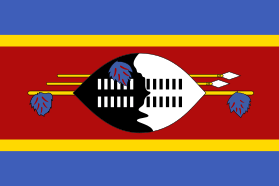Swaziland at the 2012 Summer Olympics
Swaziland competed at the 2012 Summer Olympics in London, which was held from 27 July to 12 August 2012. The country's participation at London marked its ninth appearance in the Summer Olympics since its debut at the 1972 Summer Olympics. The delegation included two track and field athletes: Sibusiso Matsenjwa and Phumlile Ndzinisa, and one swimmer, Luke Hall; the first two competitors qualified for the Games through wildcard places while Hall was awarded a universality place by FINA. Hall was selected as the flag bearer for the opening ceremony and Matensjwa held it for the closing ceremony. All three competitors did not advance further than the heat stages of their respective events.
| Swaziland at the 2012 Summer Olympics | |
|---|---|
 | |
| IOC code | SWZ |
| NOC | Swaziland Olympic and Commonwealth Games Association |
| Website | www |
| in London | |
| Competitors | 3 in 2 sports |
| Flag bearer | Luke Hall (opening) Sibusiso Matsenjwa (closing) |
| Medals |
|
| Summer Olympics appearances (overview) | |
Background
Swaziland participated in nine Summer Olympic Games between its début at the 1972 Summer Olympics in Munich, Germany and the 2012 Summer Olympics in London, England, with the exception of the 1976 Summer Olympics in Montreal and the 1980 Summer Olympics in the Soviet Union,[1] the former because of a boycott relating to the New Zealand national rugby union team touring South Africa, and the latter because the country joined the United States-led boycott over the 1979 invasion of Afghanistan during the Soviet–Afghan War.[2] No Swazi athlete has ever won a medal at the Olympic Games and the country has yet to debut at the Winter Olympic Games.[1] Swaziland participated in the London Summer Olympics from 27 July to 12 August 2012.[3] The nation sent athletes Sibusiso Matsenjwa and Phumlile Ndzinisa and swimmer Luke Hall to the Games.[3] Hall was the flag bearer for the opening ceremony and Matensjwa held it for the closing ceremony.[4][5] The athletes were coached by Muzi Mabuza and Linda Kiefer,[6] and trained in the West Devon town of Tavistock.[7]
Athletics
The 2012 Summer Games marked Sibusiso Matsenjwa's Olympic début. He was oldest competitor for Swaziland at the Games, aged 24.[3] He qualified for the Olympics via a wildcard, as his best time, 21.29 seconds set at the 2011 World Championships in Athletics, was 0.64 seconds slower than the "B" qualifying standard for his event, the men's 200 metres.[8][9] In an interview with the Times of Swaziland before competing Matsenjwa said that he was learning from training with other Olympic athletes and was confident of improving his performance.[10] Matsenjwa competed in the men's 200 metres race in the third heat of the first round on 7 August, finishing sixth out of eight athletes with a time of 20.93 seconds,[11] setting a new Swaziland national record.[12] Overall he finished 40th out of 53 athletes,[lower-alpha 1] and was 0.21 seconds slower than the slowest qualifier for the semi-finals and, therefore, that was the end of his competition.[11]
_illuminated%2C_3_August_2012.jpg)
Competing at her first Olympics, Phumlile Ndzinisa was notable for carrying the Swaziland flag at the closing ceremony.[5] She was the youngest person to compete for Swaziland at the Games, aged 19.[3] She qualified for the Olympics via a wildcard, as her best time, 54.26 seconds set at the 2011 All-Africa Games, was 1.96 seconds slower than the "B" qualifying standard for the women's 400 metres.[8][13] Ndzinisa took part in the first round of the women's 400 metres and was drawn in the fourth heat. She finished sixth with a time of 53.95 seconds, behind heat winner and eventual gold medallist Sanya Richards-Ross of the United States (51.78 seconds).[14] Ndzinisa finished 36th out of 45 athletes overall,[lower-alpha 2] and was 1.64 seconds behind the slowest qualifier who progressed to the semi-finals and that was the end of her competition.[14]
- Key
- Note–Ranks given for track events are within the athlete's heat only
- Q = Qualified for the next round
- q = Qualified for the next round as a fastest loser or, in field events, by position without achieving the qualifying target
- NR = National record
- Men
| Athlete | Event | Heat | Semifinal | Final | |||
|---|---|---|---|---|---|---|---|
| Result | Rank | Result | Rank | Result | Rank | ||
| Sibusiso Matsenjwa | 200 m | 20.93 NR | 6 | Did not advance[11][12] | |||
- Women
| Athlete | Event | Heat | Semifinal | Final | |||
|---|---|---|---|---|---|---|---|
| Result | Rank | Result | Rank | Result | Rank | ||
| Phumlile Ndzinisa | 400 m | 53.95 | 6 | Did not advance[14] | |||
Swimming

Luke Hall, who at the age of 23 was participating in his second Olympic Games,[15] was notable for holding the flag of Swaziland at the opening ceremony.[4] He qualified after receiving a universality place by FINA as his best time of 23.92 seconds did not reach the "A" or "B" standard entry times.[16][17] Hall was drawn in heat four of the men's 50 metre freestyle event which was held on 2 August, finishing fourth out of eight swimmers with a time of 23:48 seconds. He finished 36th out of 58 swimmers overall and finished 1.21 seconds slower than the slowest swimmer to progress to the next round and he was eliminated from the competition.[18]
- Men
| Athlete | Event | Heat | Semifinal | Final | |||
|---|---|---|---|---|---|---|---|
| Time | Rank | Time | Rank | Time | Rank | ||
| Luke Hall | 50 m freestyle | 23.48 | 36 | Did not advance[18] | |||
Notes
- One athlete, Alonso Edward, was disqualified, and another Ben Youssef Meité did not start.[11]
- Three athletes were not classified, and one was disqualified.[14]
References
- "Swaziland". Sports Reference. Archived from the original on 24 June 2016. Retrieved 16 October 2016.
- Mallon, Bill; Heijmans, Jeroen (2011). Historical Dictionary of the Olympic Movement. Lanham, Maryland: Scarecrow Press. pp. 69–70 & 77–78. ISBN 978-0-8108-7522-7.
- "Swaziland at the 2012 London Summer Games". Sports Reference. Archived from the original on 17 December 2012. Retrieved 16 October 2016.
- "Olympic flag bearers". United Press International. 27 July 2012. Retrieved 22 October 2016 – via General OneFile.
- "London 2012 Closing Ceremony – Flag Bearers" (PDF). Olympic.org. Archived from the original (PDF) on 28 March 2016. Retrieved 7 March 2015.
- Qondile, Shongwe (29 May 2016). "London 2012 Olympic Games Countdown... 59 Days to Go". The Swazi Observer. Archived from the original on 10 May 2013. Retrieved 16 October 2016.
- "All set to welcome Swaziland athletes". Okehampton Times. 4 July 2012. Archived from the original on 18 October 2016. Retrieved 16 October 2016.
- "London 2012 Olympics: Athletics qualification". The Daily Telegraph. 15 April 2011. Archived from the original on 2 October 2011. Retrieved 5 March 2015.
- "Sibusiso Matsenjwa – Athlete profile – Progression". IAAF. Archived from the original on 22 October 2016. Retrieved 21 October 2016.
- Magongo, Ntokozo (1 August 2012). "Local athletes mingle train with the best". Times of Swaziland. Archived from the original on 19 October 2016. Retrieved 17 October 2016.
- "2012 Summer Olympics – Results – Men's 200 meters". ESPN. Archived from the original on 19 October 2016. Retrieved 16 October 2016.
- McFarland, Matt (7 August 2012). "Day 11: Usain Bolt, gymnastics, women's basketball, beach volleyball". The Washington Post. Retrieved 17 October 2016.
- "Phumlile Ndzinisa – Athlete profile – Progression". IAAF. Archived from the original on 22 October 2016. Retrieved 21 October 2016.
- "Track and Field / Womenʼs 400m". The New York Times. Archived from the original on 12 April 2016. Retrieved 16 October 2016.
- "Luke Hall". Sports Reference. Archived from the original on 19 October 2016. Retrieved 17 October 2016.
- "FINA Universality Places" (PDF). FINA. 6 July 2012. Archived from the original (PDF) on 11 July 2012. Retrieved 6 July 2012.
- Keith, Branden (25 November 2010). "FINA Announces Qualifying Standards for London 2012". Swim Swam. Archived from the original on 20 October 2016. Retrieved 17 October 2016.
- "2012 Summer Olympics Results – Swimming – Results for Men's 50m Freestyle". ESPN. Archived from the original on 18 October 2016. Retrieved 16 October 2016.